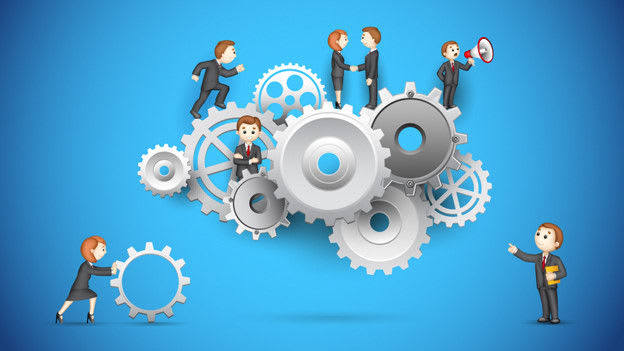![]()
The outbreak of Covid-19 has brought about a transformative impact on the functional narratives of modern-day workplaces. The pandemic has reaffirmed the fact that in a corporate ecosystem characterized by volatility, change is the only definite constant.
Processes, people and products need to be constantly sensitised to change and trained to keep pace with evolving trends and processes. HR departments of organizations will need to proactively adopt ways and means to harness change to optimise people productivity and performance.
Change has the potential to impact the efficacies of organizations at all levels and across diverse personnel cadre. As the frequency of change increases, there is a dire need to manage personnel through an effective change management policy. Failure to assess impacts and address employee concerns can have a far-reaching impact on workforce efficiency. It is the duty of HR departments to implement employee engagement programmes and lay down effective communication roadmaps to convey the importance of change to employees.
HR also needs to place emphasis on designing training modules for personnel for eliminating resistance to change and helping them ingrain a flexible mindset. They need to be reminded of the fact that change is integral to the DNA of the organization if it wants to remain agile and retain a competitive edge over its peers in terms of market share, increased revenue streams and profitability.
An atmosphere of trust and transparency between the management and employees is imperative for implementing change initiatives in an organization. Change agendas need to be communicated effectively across all cadres of employees and it should be the duty of every superior to intimate his immediate subordinate of management the changes adapted by the organization.
Priority should be placed on identifying risk factors which are becoming hurdles on the way to the implementation of change and immediate steps should be taken to alleviate those risks. Skill development programmes should be designed and undertaken at all levels to improve employee productivity and proficiency and create a conducive atmosphere for embracing change in a holistic manner.
The HR department of companies will need to lead change initiatives from the front and act as facilitators for expediting change across the organizational spectrum. Essaying the role of a communicator, implementing change policies and assessing the impact of change on employee behavior is the function of the HR department.
Conducting meetings to communicate the effect of change among different departments and issuing communiqués to explain change impacts is the functional domain of HR. It is also pertinent to perform an in-depth analysis of how changes could determine organizational trajectories and document the changes for future reference purposes. Key Performance Indicators (KPIs) also need to be identified by HR for measuring and tracking the effects of change management.
The transition to change can be effectuated by a thorough understanding of prevalent market trends and undertaking an assessment of its readiness for accepting change. The change can be an after-effect of changed government policies, shifting demographic trends, emerging technologies or new competitor policies. Any shift from a status quo calls for swift reaction from the organization to deal with an emerging crisis or benefit from a rising opportunity.
Once it is accepted that change is fundamental and needs to be dealt with on a priority basis, business leaders should take the initiative to take the change head on. A leadership hierarchy needs to be created within the organization that will identify common goals and work with a unified vision to initiate the change framework.
Regular meetings, group interactions and periodic reviews are important to monitor whether the change programme is in alignment with stated organizational objectives. It is important to create a sustainable roadmap for ensuring the smooth transition of change with an emphasis on employee motivation. The HR department needs to make it clear to organizational stakeholders that the successful implementation of change needs a long-term vision.
Any successful change management programme should consider prevalent challenges and integrate them with organizational objectives. It should come with a plan for dealing with possible resistance and ensuring successful outcomes of change decisions. Business leaders and HR departments need to be actively involved in ensuring that the change transition is a smooth and hindrance-free affair.
We are providing practical training (Labor Laws, Payroll, Salary Structure, PF-ESI Challan) and Labor Codes, Payroll Consultant Service & more:
- HR Generalist Practical Training: https://oneclik.in/hr-generalist-practical-training/
- Labor Law + Payroll-Practical-Training: https://oneclik.in/labor-law-payroll-practical-training-certificate/ (PF, ESI, Bonus, Payroll & more)
- Labor Code, 2020 (Crash Course): https://oneclik.in/labor-code2020-rules-practical-training-certificate-crash-course/
- Labour Code | Labour Bill (Labour-Law-Practical-Training): https://oneclik.in/labour-law-practical-training/ (Factory, Contact Labor, Maternity Act & more)
- PF – ESI Consultant Service: https://oneclik.in/pf-esi-consultant-service/
- Labor Law, Compliance & HR – Payroll Management
- Advance Excel Practical Training: https://oneclik.in/advanced-excel-practical-training-certificate/
Get Latest HR, IR, Labor Law Updates, Case Studies & Regular Updates: (Join us on Social Media)
- Telegram Channel: “One Clik”
- Whatsapp Group: https://wa.me/919033016939
- Facebook: One Clik
- Linkedin: One Clik
- Instagram: oneclik_hr_management
- YouTube: One Clik

